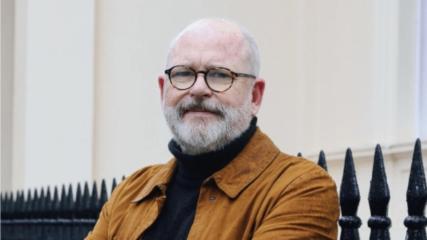New thriller by alumnus draws on Corpus intelligence expertise
A debut novel by a Corpus alumnus has been chosen by the Times as its 'Thriller of the Month' for December 2023. Shock Therapy, published by Matador and released in November 2023, has received excellent reviews, sold out its original print run, and has already been reprinted.
Its author, Angus Blair (a pseudonym), matriculated at Corpus in the early 80s. Educated at a state school in Luton, Angus had such a passion for history that he basically "taught himself" an A-level in the subject, which he was not able to take at his sixth form. At Corpus he faced a formidable admissions interview with Christopher Andrew, Hew Strachan and John Hatcher (all esteemed historians and no doubt already impressive at the time). Angus says now, "I think they were interested in the fact that I was self-motivated to do a History A-Level on my own. I was very lucky to be at Corpus and be taught brilliantly by that cohort of History academics."
His interest in the intricacies of espionage was encouraged by Christopher Andrew, and Angus completed his undergraduate dissertation on pre-war British intelligence. During his time at Cambridge he was aware of rumours of recruitment by the intelligence services, who were still keen on bringing on board agents who fit the public schoolboy mold. At several points he found himself having brushes with the intelligence services, such as in 1983 when he was debriefed in a barracks near Cambridge, questioned about his Interrail travel through Hungary and Romania, or in 1985 where he sipped dry sherry in a drawing room facing a series of interrogators "all called Mr Halliday". Angus, however, busied himself with the Cambridge University Officer Training Corps, where he was assigned to the Royal Artillery wing ("The money was decent; you know, it paid the bar bills. And I signed up to every course, every training exercise I could.").
After Corpus, Angus chose amongst several potential careers avenues, something he says "now seems bizarre because of the struggle that young people have today who are leaving places like Corpus, or any university. It was easier then." He took a position at an American strategy consultancy which led to a 30-year international career in mergers and acquisitions, professional services and client management programmes. During that time he lived and studied for a time in Japan, spent considerable time in the Soviet Union, and became an "obsessive traveller", often accompanied by his two young daughters whom he "dragged everywhere from Greenland to Ecuador".
He had a novel in him
His interest in the world of espionage continued, and Angus kept up his Corpus connections, including with acquaintances such as Peter Martland (m.1982), himself a historian in the field. He sits on the Advisory Board of the Cambridge Security Initiative (CSi), founded by Sir Richard Dearlove, former Master of Pembroke College and a career intelligence officer who was 'C' (Chief) of the British Secret Intelligence Service. When COVID hit, Angus had just stepped down from chairing one of the largest firms in the City of London and "suddenly had time on my hands". He decided to put that time to good use and signed up for an online novel-writing programme at the Faber Academy, which led to the development of his first novel.
Shock Therapy follows an 'accidental hero' named Henry Bradbury, who has just emerged from the life of an accountant in a City firm, recently divorced, in psychotherapy, with delusional semi-ambitions to become an actor. Henry finds himself recruited as an agent of the intelligence services and soon bumbles into trouble alongside his therapist Nea, the only person he can trust.
The details in the book draw on the expert tutelage Angus received from Professor Christopher Andrew, as well as his own broad experience both in business and familiarity with the intelligence services. When he was writing the book, Peter Martland introduced Angus to Corpus alumnus Gary Donnelly (m.1995), author of the DI Owen Sheen Belfast thriller series, who provided further writing advice.
The weaving of psychotherapy elements through the plot also comes from his own personal experience of therapy. Angus sees parallels between the techniques of psychotherapy and how intelligence officers handle their agents. "When you have two people in a room for an hour, they both have to decide how much they can trust each other. Will I get let down by this person? How much should I give away? And as I understand it, MI6 officers get a lot of training for their fundamental job, which is to identify, recruit, and then run agents who are being quite often put at risk. So it's core psychotherapy training, how to read people, how to use Socratic questioning. Both intelligence officers and psychotherapists use the same techniques."
Thanks to the "unexpected, unexpected success" of Shock Therapy, offers of an agent, film rights, TV scripts and more are landing in Angus's inbox. He is currently working on a sequel, The Beijing Book Club, which takes forward some of the main characters (because "everyone is interested in China's spying"). He is also working on a book with a co-author called Twelve Spy Cities, a travel guide for spy buffs. He splits his time between his homes in London and Lisbon (which will both feature in Spy Cities), and is soon to travel to Istanbul for further research. Becoming a writer may have moved on quickly from being just a hobby, but what Angus particularly appreciates is the the fact that in his new role as a full-time writer, he has more time "to talk to people and particularly to listen". Putting those Socratic skills to work, perhaps.
We look forward to welcoming Angus back to Corpus in the near future.

